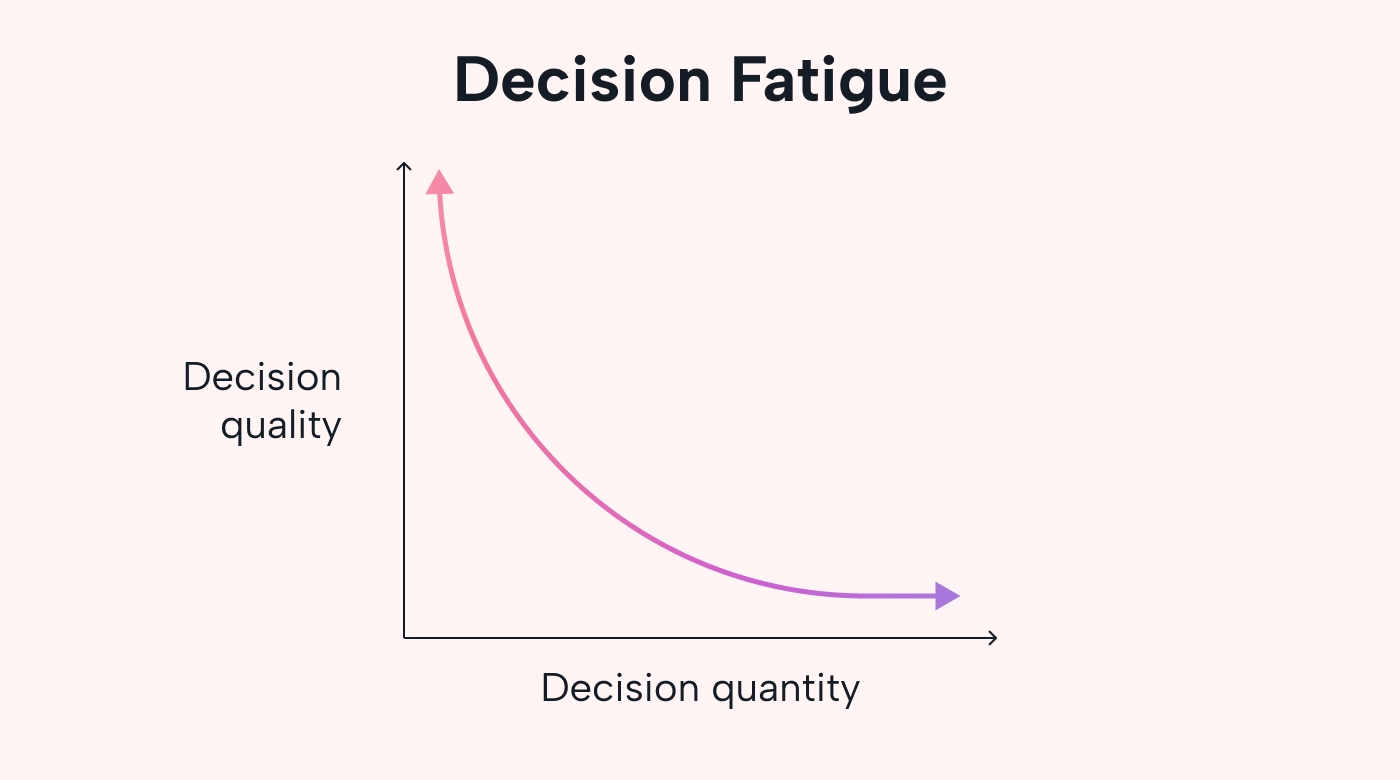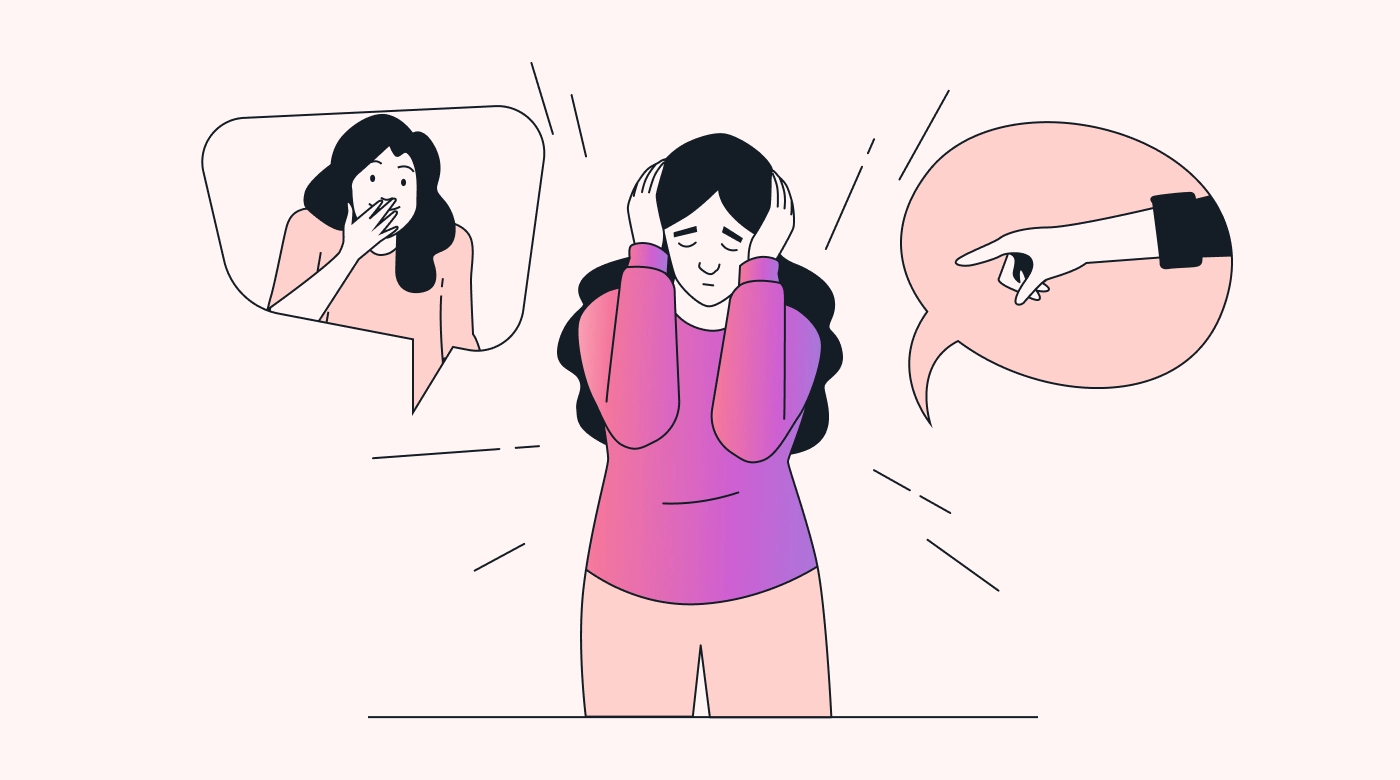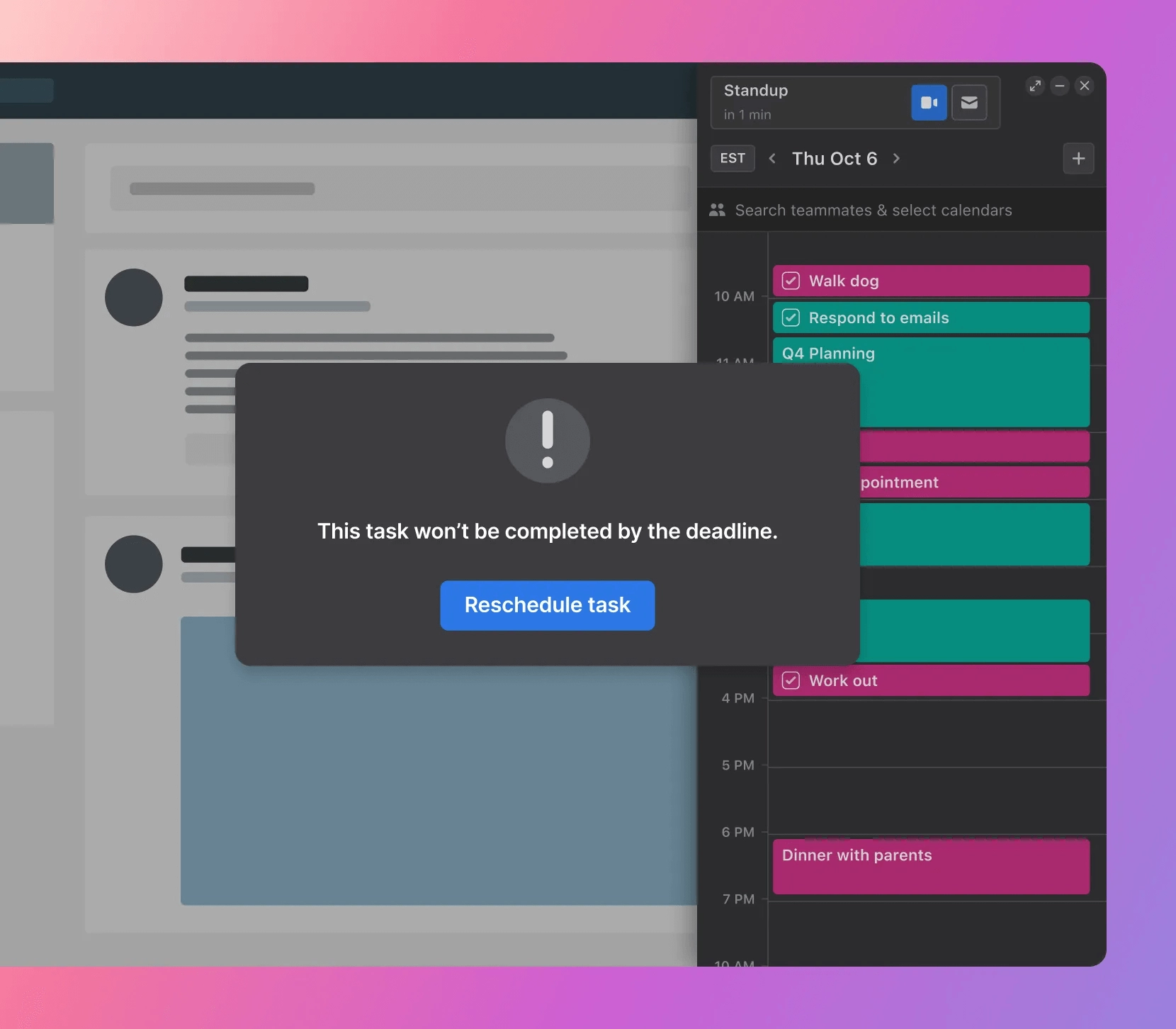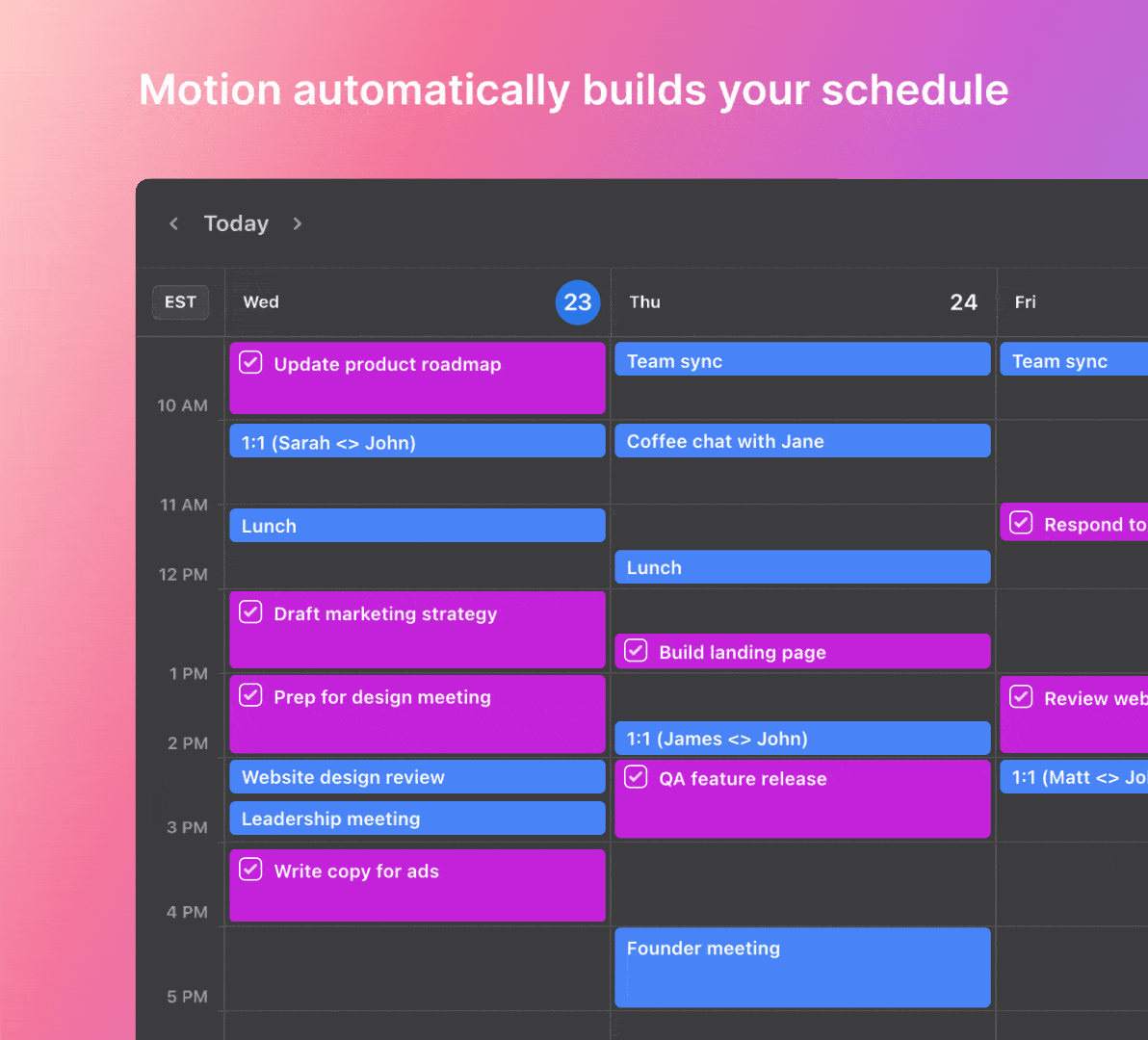Why is it so hard for some people to make decisions — even seemingly small ones?
The reality is that making decisions can be overwhelming and sometimes even terrifying.
If choosing the right ice cream flavor seems to you to be almost as hard as figuring out your career path, then this article is for you.
We explain the causes of indecisiveness and provide 10 methods to help you make confident choices going forward.
What is indecisiveness?
Indecisiveness is difficulty in making up your mind, no matter how big or small the decision. And the more time you spend deciding, the less time you have to spend doing what you need to do after the decision is made.
But what if the wrong decision leads to a mistake?
Even if that happens, remember that mistakes are golden opportunities to learn and grow.
So, if you’re indecisive, you’re holding yourself back in more ways than you might realize.
Why am I so indecisive?
Spending hours deliberating over the best approach to kick off a project only to find yourself equally stuck when choosing a lunch spot begs the question: Why on earth am I so indecisive?
Well, many factors go into indecisiveness. Let’s take a look at just a few.
Psychological factors
While many think indecisiveness is a personality trait, psychological factors, like anxiety and depression, are possible underlying reasons for indecision. Research shows that those with high levels of neuroticism tend to score particularly high on tests assessing indecisiveness.
Anxiety causes unnecessary worry about the outcomes of decisions, often leading to a cycle of overthinking that makes even minor choices seem frightening.
On the other hand, depressed individuals may struggle to make decisions due to feelings of worthlessness or a lack of interest in the outcomes of their decisions.
Past experiences of trauma or high levels of stress can also impair a person’s decision-making ability. People with these backgrounds may hesitate or avoid making decisions altogether due to a heightened fear of making the wrong choices and suffering the consequences.
Decision fatigue
We are faced with an overwhelming number of decisions daily. “Whether you’re making breakfast or deciding what to wear in the morning, your brain is making upward of 35,000 decisions each day,” says Eva Krockow, lecturer at the University of Leicester in the UK.
The responsibility that comes with making numerous decisions throughout the day can be exhausting. After a long period of decision-making, decision fatigue can set in, lowering the quality of the decisions we make. In this state, we often resort to making impulsive decisions to speed up the process or simply opt for the easiest option to cut the hassle.
Decision fatigue also affects our ability to think rationally and make logical choices. This can result in poor judgment and bad decisions in both personal and professional contexts.
 |
The paradox of choice
The more options, the better, right?
Actually, as psychologist Barry Schwartz explains, more choices make us not freer but more paralyzed, not happier but more dissatisfied.
Ironically, having too many options can overwhelm us, making us more indecisive. We call this phenomenon choice paralysis.
Choice paralysis is related to the concept of opportunity cost in decision-making — the idea that choosing one option means missing out on others.
The fear of missing out on potentially better choices makes it harder for us to be confident with our decisions. And our desire to make the best choice often results in us not choosing at all.
How being indecisive affects life and work
Indecisiveness can seem like a minor inconvenience at the moment. But the truth is that it severely impacts both your work and personal life.
Let’s discuss a few of these impacts in more detail.
Missed opportunities for career advancement and personal growth
Opportunities tend to slip through our fingers when we can’t make up our minds — and these closed doors might not open again.
Indecisiveness can mean you miss out on opportunities for personal development, such as learning new skills or traveling.
Professionally, you might face missed deadlines, overlooked projects, or even lost business ventures or career-defining moments.
Lack of innovation and risk-taking
In a job where you need to think on your feet and get creative, indecision is a silent killer.
When you’re too slow to make decisions, not only does that delay progress, but it also holds back those “aha” moments and the chance to try something new and exciting.
Similarly, indecision leads to overcaution. Sure, playing it safe can seem like a good idea, but if you're always too careful or too scared to make a decision, you might miss out on rewarding opportunities.
Just imagine watching your competitors leap ahead of you because they were brave enough to take a gamble on something new while you were still weighing your options.
Strained personal and professional relationships
Indecision can be a major source of frustration for those around you over time. Friends and family may question your commitment to plans or shared goals.
For instance, being continuously unable to make holiday plans or everyday choices, like what groceries to buy, can put a strain on your personal relationships.
One study also showed that indecisive leaders can have detrimental effects on workplaces, including stifled performance and team demotivation. This issue can trickle down through the ranks, too. Colleagues or superiors may view indecision as a lack of reliability or competence. So, instead of seeking guidance or input from you, they might start bypassing you in favor of someone who’s more decisive.
Poor self-perception and workplace confidence
If you’re always questioning your own decisions, it's easy to fall into a pattern of self-doubt. Chronic indecisiveness breeds low self-confidence, which increases anxiety and stress. This becomes a negative cycle that can impact your mental health and overall well-being.
A lack of confidence at work matters immensely, as well. When you’re not sure of yourself, you’ll be less likely to speak up in meetings, offer your own ideas, or take on challenging projects. This pattern can limit your growth within the company and prevent you from being seen as a leader in your team or field.
 |
10 methods to help you overcome indecisiveness
It’s time to put the indecisive you behind. Try out these 10 methods to become more confident and assertive in your choices:
1. Understand your decision-making patterns
Reflect on past decisions you’ve made to identify any consistent habits or biases in your decision-making process.
Once you recognize these patterns, analyze the outcomes of your decisions to figure out what usually works and what doesn’t. This is the first step toward making more informed decisions in the future.
With Motion, you can better understand your working habits and gain insights into how you allocate your time and effort. Our tracking feature lets you record your time spent on a specific task or portion of a task.
For instance, if you've completed 1 hour of a 4-hour task, you can mark that hour as completed and then reschedule the remaining 3 hours.
Understanding the patterns behind your decisions can help you make more efficient and effective decisions in the future.
2. Establish your decision-making criteria
To make more decisive choices, define what makes a “good” decision. Determine specific criteria or standards to guide your decisions, such as aligning them with your long-term goals. Then, practice applying those criteria consistently across all the choices you make.
For example, when choosing a new project, evaluate it based on your potential career growth and how it aligns with your skills.
Similarly, if you’re deciding on a team-building activity, consider how that activity could improve your team dynamics. Consistent application of your chosen criteria will help you build more productive decision-making habits.
3. Keep a pros and cons list
Creating a pros and cons list is a basic strategy — but it really works. This list visually clarifies the benefits and drawbacks of each option you have, laying out your choices in black and white.
Because this method forces you to find and confront the potential consequences of each decision, you can weigh each option objectively and with less emotional bias. It simplifies complex decisions and gives you a sense of control over your choices as you systematically assess each option.
4. Break down bigger decisions
It’s best to break down more complicated decisions into smaller, more manageable parts. This way, you’ll be able to tackle each area separately without feeling overwhelmed or pressured by that single decision. You can make more thoughtful and informed choices without missing the small details.
Use Motion to divide complex decisions into smaller tasks and track the progress of each. You’ll get a more manageable and clearer view of the bigger picture as a result.
 |
5. Try the "five-minute rule"
Are you a classic overthinker? Try giving yourself only five minutes to make a choice.
This process trains your brain to make quick decisions and to overthink less.
A five-minute time limit not only helps you get used to making decisions under pressure but also has a ripple effect on your bigger decisions. You’ll gradually build the confidence and skills needed to tackle the larger, more complex decisions with ease once you master the smaller stuff.
6. Prioritize decisions based on importance
When you’re swamped with choices, preserve your mental energy for making those that’ll have the most impact.
Motion automatically prioritizes your most important tasks for you, meaning you don’t have to constantly think about what’s most important.
7. Set deadlines for your decisions
To hold yourself accountable for making decisions, assign a specific deadline to each decision. This creates a sense of urgency, making it harder to ignore decisions that need to be made.
Motion reminds you of these deadlines, keeping you on track and encouraging you to make timely choices. This way, you turn decision-making from a passive activity into an active, goal-oriented process.
 |
8. Try visualization techniques
What would happen if you made one decision over another? Visualizing the outcomes of each of your options can help clarify which choice feels right.
Let’s say you have to decide whether to accept a job offer or stay in your current position. Imagine yourself in each scenario — how you feel about each possible outcome says a lot about which option you should choose.
While not every decision made in this way may be spot-on, you can practice trusting your intuition and learning from your mistakes.
9. Limit your information intake
As we mentioned above, too many options can actually make it harder to decide.
To simplify the decision-making process, sometimes, it’s better to limit the amount of information you gather. Focus on only the key information needed to make an informed choice.
A useful tip to avoid analysis paralysis is to set a limit on the number of resources you consult. For example, if you need some guidance on a task, ask for opinions from only two colleagues.
10. Leverage AI tools
Outsourcing the routine aspects of decision-making to AI tools frees up your mental bandwidth for more complex and important decision-making.
For instance, instead of making you decide what to do next, Motion automatically builds your daily schedule for you. No need to waste time on tedious planning or second-guessing your daily priorities. Instead, you can concentrate on making only those decisions that really matter.
 |
Stop your indecisiveness in its tracks with Motion
Don’t let indecision slow you down. Try Motion for free today and take control of your decision-making process.

Vicki Chen is a content writer and marketer using proven storytelling methods to create high-quality copy and content for SaaS companies. When she's not writing, she's spending time with Taco, her rescue dog.




